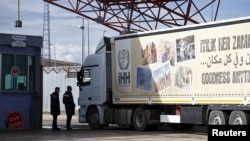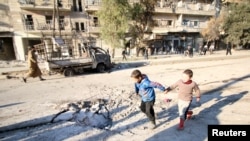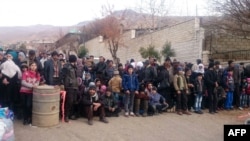The international community is mobilizing to get life-saving assistance to millions of Syrians in besieged and hard-to-reach parts of the country in the coming days.
Diplomats meeting Thursday in Munich as part of the International Syria Support Group (ISSG) agreed to cooperate and use their influence on the parties to expand humanitarian access — which the United Nations and aid groups have continually appealed for the past two years.
“We have agreed to accelerate and expand the delivery of humanitarian aid beginning immediately,” U.S. Secretary of State John Kerry told a news conference early Friday in Munich.
He said sustained deliveries would begin this week to some of the hardest to reach areas. Deir Ezzor in the northeast, which is mostly under the control of the so-called Islamic State, will receive assistance via air drops.
Foua and Kefraya in Idlib province, which are besieged by rebel groups, and government-besieged Madaya in rural Damascus, will receive aid by land. Aid trucks last reached about 60,000 people in those three areas for the first time in months in January. Mouadhimiyeh and Kafr Batna are also slated for deliveries.
“We will test it very soon — Monday, Tuesday, not later — and see whether, in fact, we will have problems as we often have had in order to reach places,” said U.N. Special Envoy on Syria Staffan de Mistura. He said if obstacles arise, they would go back to the ISSG to ask for help to make the deliveries happen.
Humanitarian task force
De Mistura said in Munich that the U.N. would be in charge of launching this initiative with support from Russia, the United States and other ISSG members.
A special ISSG humanitarian task force is being rapidly set up and held its first meeting Friday morning in Geneva. It will continue to meet weekly to monitor compliance and resolve issues on access or delivery.
“We have already submitted requests for access to the parties surrounding besieged areas. We expect to get such access without delay,” Jan Egeland, a senior advisor to de Mistura, said in a statement.
“Finally, the civilians who have been deprived of their basic right of humanitarian access for so long, will have hope,” he added. “Let us not fail them.”
Task force members include the United States and Russia, relevant U.N. entities and members of the ISSG with influence on the parties that are in a position to ensure humanitarian access.
ISSG members will also work with the Syrian parties to ensure the immediate approval of more than a hundred pending U.N. access requests. Just over a dozen of those requests have been approved in the past months.
Welcome development
“The people of Syria - in Aleppo, Madaya, Foua and Kefraya, Deir Ezzor and elsewhere - need an end to the brutal violence and bombing, the sieges, denial of free movement, food and medical care,” U.N. humanitarian chief Stephen O’Brien said in a statement on Friday, welcoming news of the planned cessation of hostilities and aid access.
He added that the U.N. and its partners need safe, sustained access for humanitarian workers across Syria. “We remain committed and ready to deliver aid and protection for civilians in desperate need, whoever and wherever they are,” he added.
O’Brien’s office says there are 4.6 million people in need in hard-to-reach parts of Syria. Nearly a half-million of them live in areas described as “besieged” by government forces, the opposition or terrorist groups.
In the past week alone, heavy shelling by the government has displaced more than 50,000 people in northern Syria, many of them making a dangerous dash to the Turkish border to escape Russian-backed Syrian air force bombings.
Under the Munich plan, all groups using heavy weapons would stop next week as a first step to a negotiated nationwide cease-fire. If implemented, it will improve aid access and possibly pave the way to a resumption of U.N.-brokered peace talks among the parties that were suspended earlier this month.














